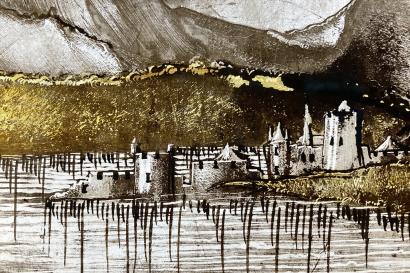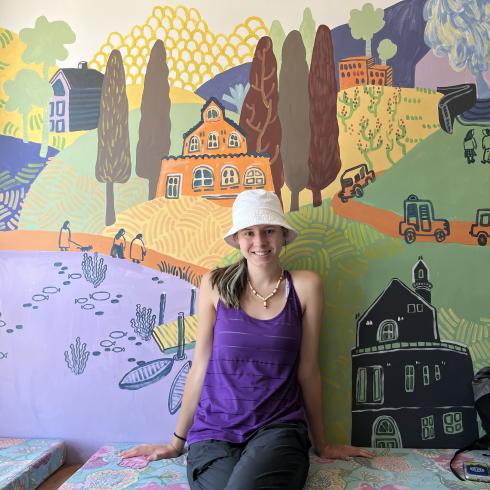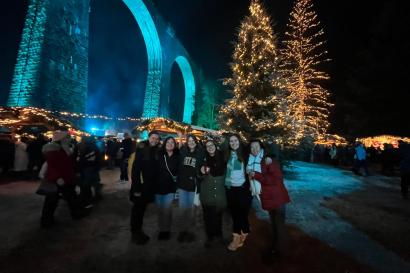
Travel is experiencing a revolution. In the decade or so between our youth and the present day, resort hotels have given way to Airbnb rentals and road trips exchanged for staycations. One of my earliest memories is of playing in the pool at a Jamaican resort, the kind where carefully curated landscapes mask the poverty and infrastructural decay outside of closed gates. Since then, my family and I have traded escapism for travel that takes advantage of opportunities to enrich our understanding of the world, even if that world is only a town or a state away. Now I am here in Freiburg im Breisgau, Germany, on what is perhaps the most meaningful and educational adventure of my life.
Study abroad hasn’t undergone the same conversational shift that traditional travel has. In my parents’ day it was seen as chance to party hardy while attending university, and whenever I bring up the topic of study abroad in the present day, people’s excitement still shifts to club culture or the lower drinking ages abroad. But I’m not convinced. After interacting with my peers in the IES Abroad program, I can confirm that the student seeking personal and academic growth isn’t the exception; it’s the rule. So I guess we’re all raving about the fun but secretly (or not-so-secretly) gearing up for a serious learning experience. With this in mind, I want to have a real conversation about studying abroad, one that addresses the concerns that I and maybe you have had.
This discussion touches on some contemporary travel trends such as dark tourism and climate concern, the latter being especially poignant for a generation that has inherited a global ecosystem on the brink of collapse. The irony of study abroad, and of my program in particular, isn’t lost on me. I came here to study sustainability but did so on the wings of a jumbo jet, what the New York Times calls the “biggest single action a private citizen can take to worsen climate change.” Ouch. Brace yourself, it’s about to get worse. Carbon emissions are directly linked to the melting of arctic ice, which means my flight is destroying the home of polar bears and so will yours! I apologize for bringing furry animals into the mix, but it had to be done.
So why am I raining on our collective parade? Well, I believe that most college students, especially those who go abroad, want to face these big questions as part of their life and career. We walk into those ivy-covered halls with big dreams of real change, the same dreams we carry with us as we exit the plane. Even if we go to the most peaceful, beautiful destination imaginable, we are choosing to face head on rather than escape the problems we seek to solve as adults. I am no stranger to this sort of dark tourism. When I was in Israel this summer, a tense political state loomed like a shroud, and a visit to the West Bank further shattered any illusions of relative social harmony that prevailed from my life in America. Germany is different than Israel in that it’s a sustainability utopia compared to back home, but the effect is the same. Whenever a bike passed by or I caught the glint of a rooftop solar panel, my quest for a more sustainable world—and the depressing environmental situation that these solutions imply—would hit me in the face like a ton of bricks. I picked a place where I couldn’t ignore the truth of the world we live in, but also a place in which I could learn about the solutions to heal this reality. That’s how I’ve chosen to make it right.
When travel is so destructive, it can’t just be for fun anymore. It must mean something, contribute something. For every one of us, study abroad is an opportunity to understand certain realities more deeply and personally than we ever could from a classroom. These lessons become a part of us because we’ve lived them firsthand, seen the pain, and participated in the solution. If you are considering study abroad now, ask yourself how you can turn your time overseas into something more than just an escape. My recommendation: Use it as an opportunity to arm yourself with irreplaceable understanding and fight for what you believe in—the dream you entered college with, the one you exit the plane with, and at the end of it all, the one you return home with.
NYT article: https://www.nytimes.com/2019/06/03/travel/traveling-climate-change.html

Isabel Pineo
Hi there! My name is Isabel Pineo and I am coming to you this semester from Freiburg im Breisgau, a charming city in the Black Forest of sunny southern Germany. The official reason I’m here: to learn about environmental studies in a culture and urban setting known for its emphasis on sustainability. Unofficial reason: to eat amazing food, go on lots of hikes, meet fascinating people both local and foreign, and to focus on putting my physical and mental health first. I guess you could say that I’m searching for answers to the question of what it means to live rightly in the world, for the Earth and for ourselves. Since most of us have been asking that question for a very long time, I’ll be sure to update you on all the answers I find as the semester progresses!








